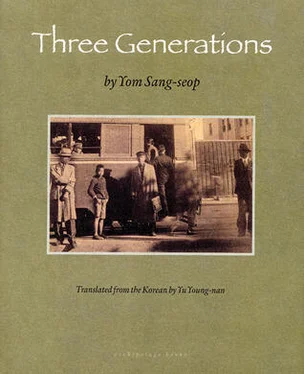When they reached the edge of Dangju-dong, Gyeong-ae wanted to tell Sang-hun to go home, but the words stuck in her throat. She had no choice but to walk the dark alley with him again and try to stay a step behind.
“Let’s not talk about such trivial things. ” He stopped short and stood shoulder-to-shoulder with Gyeong-ae. “You should get married soon! Once you’re married — ”Abruptly he stopped talking. Gyeong-ae was a little relieved, waiting for what would come next, when all of a sudden something warm touched her hand. A shiver coursed through her body; she lost her balance and almost fell.
Gyeong-ae couldn’t shake his hand away, so she took several more steps. She held her breath, although even a stunned pigeon in her place would have let out a coo. He squeezed her hand as if to crush it, and then just as abruptly released it. “Go home! Go on,” he shouted, as if angry. He spun around and was gone.
Gyeong-ae looked back at the black shadow disappearing into the darkness, then letting her head drop, she stood quietly for a moment. Passers-by threw curious glances at her.
Her mind went blank. She felt like crying, but her eyes were dry.
The experience of the past few hours had changed her world in a flash. But the world didn’t belong to Jo Sang-hun, so how could it suddenly seem so different? The world now eluded her; it was at once terrifying, shameful, utterly ridiculous, delightful, and full of hope.
The next day, Gyeong-ae didn’t have the courage to go to work. Exhausted after a sleepless night and trying to hide her insomnia from her mother, she was afraid to face Mr. Jo, who might have gone to school that day. She felt ashamed and out of sorts. And scared. Something of the utmost importance had to be settled, but she didn’t know precisely what it was.
Her mother was worried that she might have caught a cold after her outing in the chilly air the night before. She talked about running to the pharmacy to fetch some medicine, but Gyeong-ae refused everything her mother offered and stayed in bed all day. She wanted to be alone, away from her mother.
Is he insane? Or was he just drunk? What else could have made him act that way? She came to the conclusion that Mr. Jo was not crazy. Nor had he been all that drunk.
She tried to remember his exact words about being ashamed in front of his children, but she couldn’t recall them. She was sure she understood at least part of what he was trying to say to her. She certainly hadn’t expected to hear that. Still, what did he mean by telling her to get married?
“Let’s not talk about such trivial things. Once you are married. ” She remembered how Mr. Jo had abruptly cut off his words. What was trivial about any of this? I should get married? And then what? Gyeong-ae was at a complete loss.
In truth, Sang-hun had been talking to himself. He had thought that if he only stopped prattling and let Gyeong-ae get married, his heart might calm down and nothing would happen between them. He decided that the only way to avoid the dangerous route his heart was leading him toward was to get Gyeong-ae married as soon as possible.
Gyeong-ae returned to school the following day. As she was about to head to second-period class, Mr. Jo entered the teachers’ lounge. Since few people asked after his health, she figured he must have come to school the day before. Mr. Jo was not the Mr. Jo from the other night. He was the same Mr. Jo she had known all along. She could detect nothing different in the way he greeted her.
Gyeong-ae was once again thrown into confusion. What had happened two days earlier now seemed like a dream. To her mind, human beings protected themselves not only with layers of clothes, but also with invisible shields, hundreds and thousands of them. And Mr. Jo wasn’t the only one. She took a second look at everyone she came across. She felt as naked as a newborn, and she wasn’t proud of lacking her own protective shields; she thought it was odd. This was how she first learned to wear the armor of lies.
At the end of the day, Gyeong-ae quickly gathered her books and rushed out of the teachers’ lounge. She ran into Mr. Jo at the door as he was coming in. His eyes darted left and right to see if anyone was around as he slipped an envelope out of his coat pocket and handed it to her. Gyeong-ae felt her face flush as she took it from him. She was delighted to receive the letter yet terrified that someone might see them together. She hid it beneath her book bundle without a word.
In the letter, Sang-hun asked why she hadn’t come to school the day before and repeated several times, with great sincerity, that both of them should forget what had happened. He also asked for her forgiveness. Her heart had been racing when she opened the envelope, but now Gyeong-ae was disappointed. She had expected to read something meaningful in the letter and she felt deflated by what was missing. Not that she was desperately longing for Sang-hun and for something more profound, but this letter was so bland!

But who would have known all the details of what had happened five years earlier? All that Deok-gi knew, and all that Gyeong-ae’s mother knew, was how it all ended, not how it started. The child who’d fallen asleep in her mother’s arms revealed the outcome but not the details. To Gyeong-ae and Sang-hun, as well, it was now only a fleeting memory.
Less than five months after receiving Sang-hun’s first letter, Gyeong-ae resigned from the school. Soon after that, she left Seoul, saying she was going to study in Tokyo — which sounded very nice. She did, in fact, go to Tokyo, but not for the luxury of studying abroad — she went to take reluctant refuge.
When the other teachers at school heard of her plan to study in Tokyo, they traded glances and asked, “Who’s paying her tuition?” In other circles, it might not have attracted much attention, but within the church, the whispers snowballed into a full-blown scandal.
Gyeong-ae went to Tokyo and hid herself away in the outskirts of Omori for three months, feeling like a prisoner the whole time. It was not that she had to perform manual labor or that she was poverty-stricken. Rather, she felt as lonely as someone sent into exile. The pain of not being able to meet her beloved was mutual, but there was no way Sang-hun could leave Seoul. If he had quietly gotten away even for a week, the rumor that he had followed Gyeong-ae to Tokyo would have fanned the flames of gossip just when talk of the affair was dying down. Less than three months later, Gyeong-ae returned to Seoul like a fugitive. She arrived at Yongsan Station, where her mother met her and took her home in a car late at night, to avoid being seen by anyone. This was when Gyeong-ae saw for the first time the house at Bungmi Changjeong where they now lived.
This was the house Sang-hun had prepared for her. There was no good reason to find a place in this area, which was near the church and the school. After settling in Dangju-dong, Gyeong-ae’s mother had attended a church nearby. She didn’t want to live in her former neighborhood. The area near Samcheong-dong was simply out of the question. What Sang-hun did was force the chief clerk at Daeseong Rice Mill — who had rented this house from Sang-hun’s father, the proprietor of the mill — to move out in order to let Gyeong-ae’s mother move in. Once the matter had been settled, Sang-hun thought that the arrangement was rather clever, since no one would suspect they lived so close by; it’s said that the ground directly beneath the lantern is always the darkest.
When Gyeong-ae moved into the new house, seven months pregnant and with a belly big enough to draw the world’s attention, she felt so relieved that she was finally able to breathe easily again.
Читать дальше













